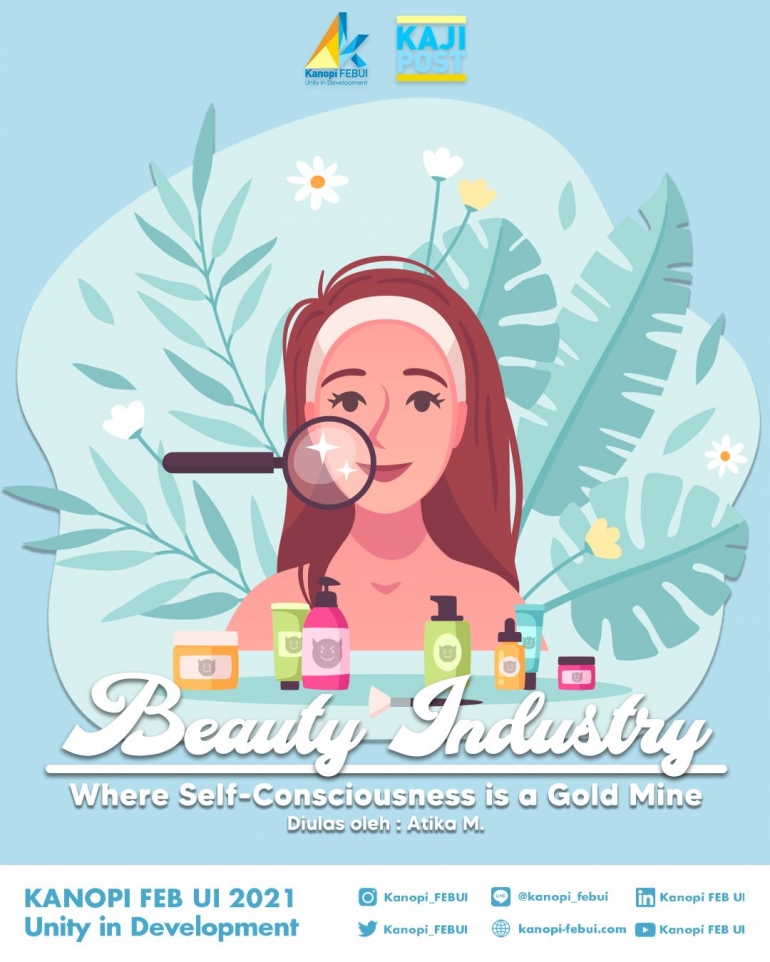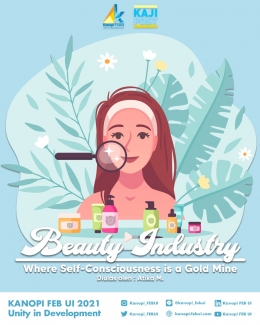Socialized Insecurities
How young were you when you first saw a commercial for a beauty product, portrayed with seemingly perfect people living perfect lives? The likely answer for many of us is probably too young to even remember.
Why is it that, despite recent progress towards representation and diversity, there is still an unspoken wish that many of us still want to look and be perceived a certain way? Though the answer to that question may be too simple to answer with one definitive cause, the Halo Effect is one of the biggest perpetrators.
We all are familiar with the heaps of commercials of beautiful women and handsome men, that conveniently fit the beauty standard, promoting beauty products to enhance our appearances, minimize pores, give shinier hair, and other minor "imperfections" in our appearances. This is an eerily common advertising strategy used by major companies in the beauty industry.
The Halo Effect is a type of cognitive bias where our perception of an identity is positively influenced by their other (often unrelated) traits (Perera, 2021). Many advertisements appeal to this cognitive bias we all inherently have: by portraying picture perfect lives that are (usually) completely unrelated to the product it is actually trying to sell.
Unattainable Beauty Standards and Pretty Privilege
There is a colossal burden placed by society upon everyone to fit into a certain mold in order to be perceived as attractive, which indirectly translates to being valued by others. Though we all know appearances do not represent our value, we cannot ignore that fitting into society's beauty standard gives people a certain amount of privilege, where they are often given 'special treatment'. Additionally, we also should not ignore that many of these advertisements that appeal to cognitive biases are targeted towards a majority demographic of women. "In general, women's purchases account for 80-90% of an estimated $500 billion market for beauty products" (Elsesser, 2019). Undoubtedly, other industries (such as physical fitness) also profit off of the insecurities of men. However, there is a massive gap specifically in the beauty industry and more often than not, its success can be credited to the exploitation of women's insecurities.
Insecurities = More Incentive to Buy = More Money
The beauty industry is first-rate when it comes to capitalizing on women's self-consciousness and insecurities. It has the ability to single-handedly devalue natural human conditions into something that lacks aesthetic and "needs fixing".
This age-long practice along with the impossible beauty standard is a tag team duo constantly reinforcing one another. This can be seen in the vast range of beauty products that cater to women; all the way from 'anti-aging' products, to products that 'minimize pores'. Additionally they advertise by asking vague questions such as "Want to be more confident with your hair?", to leave it to the interpretation of the viewers, thus allowing them to relate it to their own insecurities (Purpora, 2020).
These major players begin by glorifying picture-perfect (and 100% edited) portrayals of women then essentially taking women's insecurities and churning it out onto their packaging, before plastering it everywhere for unknowing women to see and feel pressured into buying.
The most appalling of all is how the industry as a whole has stigmatized the human condition, turning it into something they can cash out on. It is critical to understand that things such as pores and aging are both natural and are the key experiences in being human--not something easily changed by bottled night cream. However, they have created campaigns and marketing strategies that make their majority of audiences think that it is exactly what they need.
How Conventionally Attractive People Set a Halo Effect
The current trend of endorsing social media influencers is also one of the most effective ways brands sell their products by pandering to women's insecurities. Social media influencers have amassed a large number of following typically for the fact that they are conventionally attractive, which is why many women look up to them.
So when consumers see their favorite influencer promoting a product saying that it fixed their insecurities or enhanced their perceived beauty, it successfully creates a Halo Effect of the product. Intuitively, the thought process becomes: If this conventionally attractive person says that the product has contributed to their attractiveness, then it must also be able to bring me one step closer to the beauty standard.
Re-evaluating Purchasing Behavior
Oftentimes, women purchase beauty products that they already have a variation of or even something that eventually fails to live up to its expectations. This causes a lot of waste in terms of money as well as products. Most women are probably familiar with having heaps of half-empty beauty products that they no longer use but still refuse to discard. Yet despite this, consumers still repeatedly fall for the advertising traps and cognitive biases.
Perhaps it is time to re-evaluate purchasing behavior to avoid falling into the consumerism pattern that will most likely end up being wasteful. It is important to focus on the facts of the products such as ingredient contents and benefits.
Checking customer product reviews is also helpful in making a purchasing decision and as customers are not paid to leave reviews, it can lead to more genuine opinions. Ultimately, it is in our own hands to not fall prey to sly advertisements. There is no way to convince the industry to stop creating polished, curated beauty in advertisements, so it must be up to us to think critically and do what is best for ourselves.
References
Elsesser, K. (2019, October 28). The link between beauty and the gender gap. Forbes. Retrieved September 10, 2021
Perera, A. (2021, March 22). Why the halo effect affects how we perceive others. Halo Effect: Definition and Examples | Simply Psychology. Retrieved September 10, 2021.
Purpora, S. A. (2020, August 5). How the beauty industry runs on your insecurities. The Odyssey Online. Retrieved September 10, 2021
Baca konten-konten menarik Kompasiana langsung dari smartphone kamu. Follow channel WhatsApp Kompasiana sekarang di sini: https://whatsapp.com/channel/0029VaYjYaL4Spk7WflFYJ2H








